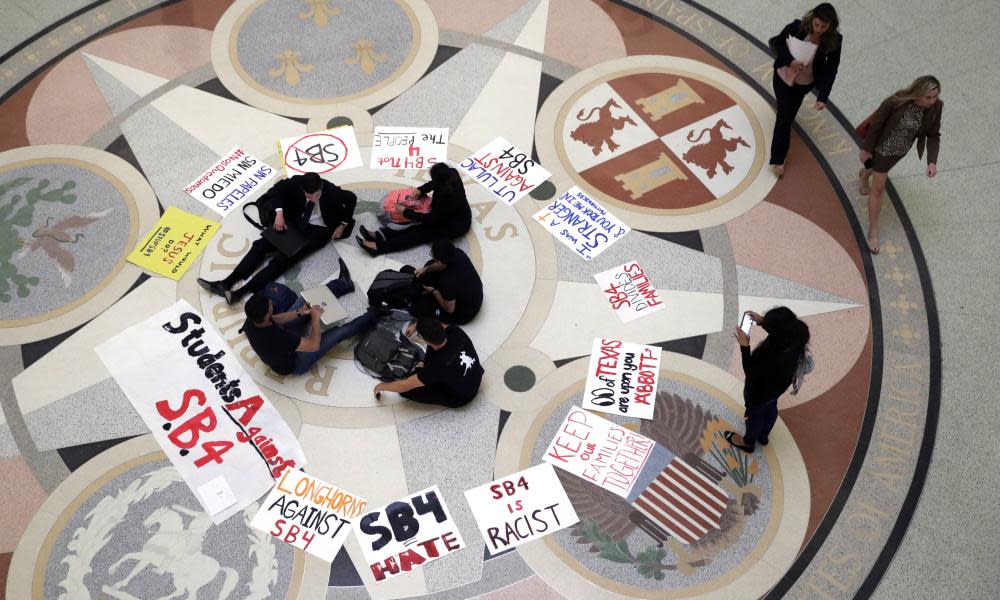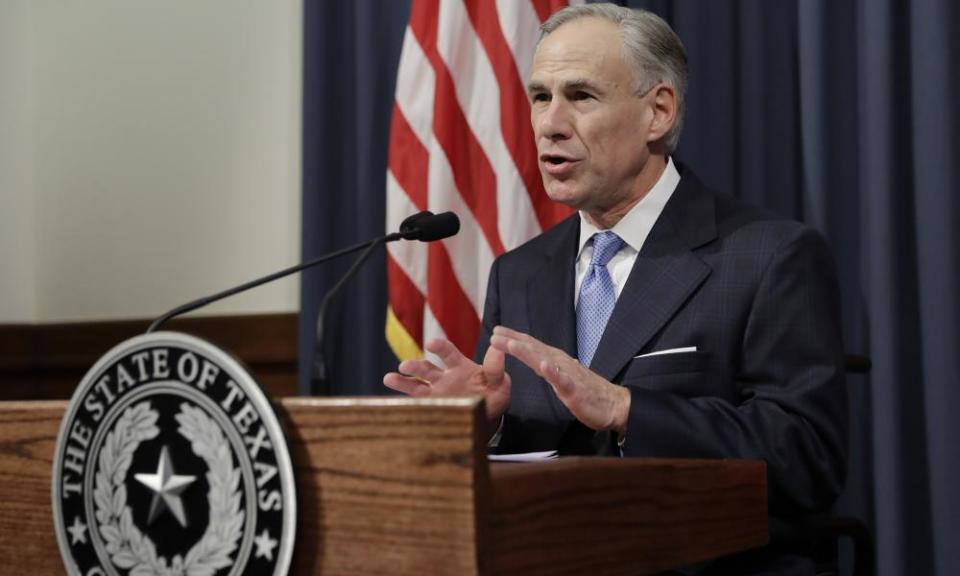Texas Latinos greet court date for 'show me your papers' SB4 immigration law

Anger at Texas’ strict new immigration law simmered as a thousand Latino policymakers and advocates gathered in Dallas this weekend, ahead of a hearing in which civil rights groups will ask for the measure to be blocked.
A federal court in San Antonio will hear arguments on Monday, with judge Orlando Garcia to decide whether to grant a preliminary injunction that would stop the law, known as SB4, from taking effect on 1 September.
Among those fighting SB4 are Texas’ biggest cities, Latino organizations and the American Civil Liberties Union (ACLU), which successfully argued earlier this year that Donald Trump’s travel ban affecting some majority-Muslim nations was unconstitutional.
The Trump administration and other Republican-led states will be watching the outcome closely, though the battle appears likely to end up in the US supreme court.
SB4 cast a cloud over the annual conference of the Naleo Education Fund, a nonprofit, nonpartisan group that aims to boost Latino political participation. Organizers took advantage of the coincidental timing and location of the gathering to hold strategy sessions aimed at developing resistance. Many in attendance sported red “NO SB4” badges.
“It was political pandering to a part of the electorate that hates immigrants and this is anti-immigrant and anti-Hispanic,” Rafael Anchia, a Dallas-area Democratic state representative, said of the law.
“Because immigration and border security issues poll so highly in that small sliver of the Republican primary electorate, and fear of immigrants is a big part of that, you have ambitious statewide politicians who saw Trump win by nine points in Texas trying to adopt that ideology.”
Anchia was optimistic that SB4 would be derailed in court. “I do think we will defeat it and it will not go into effect,” he said.
SB4 is in some aspects redolent of Arizona’s SB1070, a “show me your papers” law that was passed in 2010 but largely neutered by court challenges. Conference-goers in Dallas also recalled California’s Proposition 187, a measure passed by voters in 1994 that would have denied social, health and educational services to undocumented immigrants. It was swiftly halted in court.
The Texas law would in effect ban “sanctuary cities” – places that offer limited or no cooperation with immigration authorities – by criminalizing and fining officials who do not accede to requests to hold immigrants for federal pick-up and potential deportation.
It would also empower local law enforcement officers to ask about the immigration status of people they detain, for example at a traffic stop, which detractors say is a gateway to racial profiling.
In a January executive order, Trump signaled his intent to withhold federal funds from sanctuary cities, an effort that was frustrated by a federal court ruling. But last Friday the Department of Justice filed a “statement of interest” in support of SB4 that described it as constitutional and an “important decision” in ensuring uniform cooperation throughout the state.
Among the legal arguments being mounted against SB4 is that it violates the constitution in multiple ways: by intertwining a state in a federal matter; by prohibiting officials from criticizing state immigration policies; by inviting arrests without sufficient cause and due process; and by encouraging discrimination.
Critics also claim that the provision to oust elected officials who do not comply with the law violates the Voting Rights Act.
‘A chilling effect’

SB4 was passed amid protests and tensions that spilled on to the Texas House floor, where last month a Republican lawmaker said he had called Immigration and Customs Enforcement officers on demonstrators he assumed were undocumented, and threatened to shoot a Democratic representative in self-defense.
Anti-immigrant currents in the state were given fresh energy by Trump and mixed with efforts by Texas Republicans – who draw much of their support from suburban and rural areas – to crack down on policies instituted in diverse and liberal-leaning major cities.
The four largest cities in Texas – Houston, Dallas, San Antonio and Austin – have joined a legal challenge kicked off by El Cenizo, a tiny border outpost with a sanctuary policy.
El Cenizo sued on 8 May, the day after Texas’ Republican governor, Greg Abbott, signed SB4 into law with minimal notice in a Facebook Live event on a Sunday night, denying reporters the chance to pose questions and demonstrators time to mobilize. Last month, the Texas Observer reported, protesters played mariachi music at 3am outside Abbott’s mansion in Austin and brandished a sign that declared: “No bedtime for bigots.”
Advocates of SB4 describe it as a law-and-order measure to ensure criminal immigrants are not released into society before they can be deported, but it is opposed by law enforcement officials in some of Texas’ biggest urban areas who fear that it will harm community relations.
“I just think it’ll have a chilling effect with people being afraid to come forward to report crimes or to serve as witnesses,” said Ed Gonzalez, sheriff of Harris County, in the Houston area.
Houston’s police chief, Art Acevedo, said at a press conference in April that the number of Hispanic people reporting rape had fallen by almost 43% compared with last year, with other violent crime reporting down by 13%. In contrast a rising number of crimes in those categories were reported by non-Hispanic people.
At the Naleo conference, immigrant rights activist Adriana Cadena said: “It didn’t matter what people from Texas had to say or how many came out to testify against it. What mattered was pushing their own agenda and that’s not representative of the kind of democracy that we should be living in.”
Cadena was brought to Texas from Mexico as a child, crossing the Rio Grande and reaching Texas’ interior at the second attempt after first being deported. The 42-year-old said she grew up in a small town near Dallas where she was subjected to anti-Hispanic slurs and was as scared of the local police as of federal immigration agents.
Cadena became a US citizen after Congress passed a law in 1986, during the Reagan administration, that granted legal status to 2.7m undocumented migrants.
Latino community leaders are hoping to harness the sense of outrage. Among the ideas Cadena floated on Saturday are supporting the lawsuit, voting out officials who backed SB4, targeted economic boycotts, voter education and programs to increase election turnout, passing city council resolutions in solidarity, and mass protests on1 September.
“We’ve been given through SB4 a very powerful platform,” Cesar Blanco, a Democratic state representative, said during one session.
Still, said another speaker, Gabriel Sandoval, an attorney from California who worked to defeat Proposition 187: “Who would have thought that we would be in the situation where we are now, where we are fighting for basic rights?”

 Yahoo News
Yahoo News 
